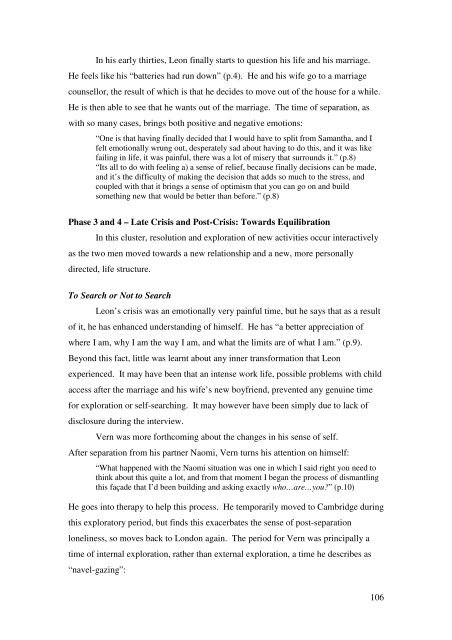DEVELOPMENTAL CRISIS IN EARLY ADULTHOOD: A ...
DEVELOPMENTAL CRISIS IN EARLY ADULTHOOD: A ...
DEVELOPMENTAL CRISIS IN EARLY ADULTHOOD: A ...
Create successful ePaper yourself
Turn your PDF publications into a flip-book with our unique Google optimized e-Paper software.
In his early thirties, Leon finally starts to question his life and his marriage.<br />
He feels like his “batteries had run down” (p.4). He and his wife go to a marriage<br />
counsellor, the result of which is that he decides to move out of the house for a while.<br />
He is then able to see that he wants out of the marriage. The time of separation, as<br />
with so many cases, brings both positive and negative emotions:<br />
“One is that having finally decided that I would have to split from Samantha, and I<br />
felt emotionally wrung out, desperately sad about having to do this, and it was like<br />
failing in life, it was painful, there was a lot of misery that surrounds it.” (p.8)<br />
“Its all to do with feeling a) a sense of relief, because finally decisions can be made,<br />
and it’s the difficulty of making the decision that adds so much to the stress, and<br />
coupled with that it brings a sense of optimism that you can go on and build<br />
something new that would be better than before.” (p.8)<br />
Phase 3 and 4 – Late Crisis and Post-Crisis: Towards Equilibration<br />
In this cluster, resolution and exploration of new activities occur interactively<br />
as the two men moved towards a new relationship and a new, more personally<br />
directed, life structure.<br />
To Search or Not to Search<br />
Leon’s crisis was an emotionally very painful time, but he says that as a result<br />
of it, he has enhanced understanding of himself. He has “a better appreciation of<br />
where I am, why I am the way I am, and what the limits are of what I am.” (p.9).<br />
Beyond this fact, little was learnt about any inner transformation that Leon<br />
experienced. It may have been that an intense work life, possible problems with child<br />
access after the marriage and his wife’s new boyfriend, prevented any genuine time<br />
for exploration or self-searching. It may however have been simply due to lack of<br />
disclosure during the interview.<br />
Vern was more forthcoming about the changes in his sense of self.<br />
After separation from his partner Naomi, Vern turns his attention on himself:<br />
“What happened with the Naomi situation was one in which I said right you need to<br />
think about this quite a lot, and from that moment I began the process of dismantling<br />
this façade that I’d been building and asking exactly who…are…you?” (p.10)<br />
He goes into therapy to help this process. He temporarily moved to Cambridge during<br />
this exploratory period, but finds this exacerbates the sense of post-separation<br />
loneliness, so moves back to London again. The period for Vern was principally a<br />
time of internal exploration, rather than external exploration, a time he describes as<br />
“navel-gazing”:<br />
106
















